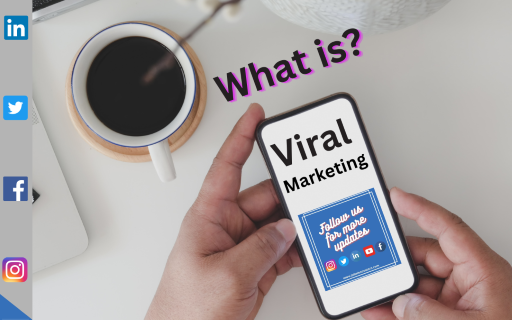
Viral marketing is a digital marketing technique that tries to develop content that is so engaging and shareable that it travels quickly over social media and other digital channels. It is a highly effective method for companies to improve brand visibility, build brand recognition, and generate conversation about their products or services. In this post, we will define viral marketing, explain how it works, and discuss the advantages and disadvantages of employing it as a marketing technique.
Table of Contents
What is viral marketing?
Viral marketing is a marketing technique that relies on developing highly shareable content that travels quickly via social media and other digital platforms. The goal is to make something so interesting and entertaining that people can’t help but share it with their friends and followers. The most effective viral marketing initiatives elicit powerful emotions such as humour, surprise, wonder, or nostalgia.
Hotmail launched the world’s first viral marketing campaign in 1996, and it helped the company attract over 1 million customers in only a few months without spending a single dollar on advertising. At the bottom of each email, the corporation inserted a simple remark: “PS: I Love You.” Hotmail offers free email.” This message was automatically included in every email sent by Hotmail users, and it aided in the quick dissemination of information about the service. This basic and low-cost strategy became the foundation for today’s viral marketing initiatives.
How does viral marketing work?
Viral marketing works by utilising the power of social networks to quickly and effectively spread a message. The secret to creating content that people want to share with their friends and followers is the key to a successful viral marketing campaign. This can be accomplished in a variety of ways, including the creation of amusing, startling, or informative movies, photos, or memes.
Once developed, the information is spread via social media and other digital platforms. If the content is interesting enough, individuals will begin to share it with their friends and followers, who in turn will share it with their networks, and so on. This causes a ripple effect, which rapidly spreads the content to a large audience.
Benefits of viral marketing
There are many benefits of using viral marketing as a marketing strategy
- Increased brand awareness – Viral marketing can help to increase brand awareness by spreading your message to a wider audience.
- Cost-effective – Viral marketing is often less expensive than traditional advertising methods, such as TV or print ads.
- Increased engagement – Viral marketing campaigns can be highly engaging and can help to build a deeper connection between your brand and your audience.
- Improved credibility – Viral marketing can help establish your brand as a thought leader and an authority in your industry.
Drawbacks of viral marketing
While viral marketing can be highly effective, there are also some drawbacks to consider
- Lack of control – Once the content is released, it can be difficult to control how it is shared and who shares it.
- Short lifespan – Viral content can have a short lifespan and can quickly be replaced by the next viral sensation.
- Difficulty in predicting success – It can be challenging to predict which content will go viral and which will not, making it a risky strategy.
Viral marketing may be an extremely efficient technique for firms to improve brand recognition and awareness. However, it is critical to realise that it is a strategy with both advantages and disadvantages. Businesses may generate content that is extremely engaging and shareable while minimising potential dangers by recognising the risks and rewards of viral marketing. Finally, the secret to viral marketing success is to generate content that is captivating, unique, and highly shared.
Check out our digital marketing services for your business growth